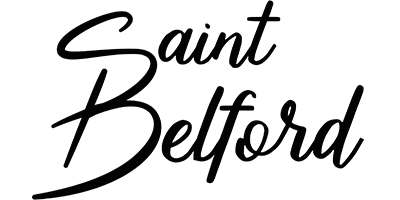Your Cart is Empty
Free shipping to AU & NZ on orders $59+ | Due to high volume please allow 3-6 business days dispatch
Free shipping to AU & NZ on orders $59+ | Due to high volume please allow 3-6 business days dispatch
How to Use Your Planner Daily (And Make This Habit Stick)
February 01, 2021

This post was written by Alex Phillips, Co Founder of Saint Belford.
Ever purchased a planner and stopped using it by the last week of January?
Yep, us too. It’s pretty common actually!
So, what do you do when the “new year” enthusiasm kind of fades away?
Start implementing these tips to keep your planning game strong!
Keep it visible
Put your planner in a highly visible location, where you’ll typically use it. Remember that your habits are largely influenced by the environment that you’re in and the cues you’re exposed to which means a small change in what you see can impact the habits you do/don’t engage in.
It’s a lot easier to follow through with your good habits when there are positive cues/reminders sprinkled throughout your home/work space that prompt you to use your planner.
Ask yourself:
Where do I like to plan my day?
Once you have the answer, optimise that space to ensure that every time you are in that location, you are reminded to use your planner.
If your desk is your go-to planning station, keep your diary on your desk and make sure it’s visible to you. Keeping it hidden away in a drawer or underneath a pile of magazines will only hinder your habit.
Here are other examples of positive cues you could also implement to maintain your planning habit: sticky note on your laptop “have you opened your planner today?” or a phone reminder asking the same thing.
Set a habit intention
Setting a habit intention clarifies the “when” and “where” of your habits. It increases the likelihood of you following through with your habits because the plan alleviates decision fatigue—you don’t have to figure out the “when” and “where” every single day. It promotes consistency.
You can use the formula below to set a habit intention:
I will [behaviour] at [time] in [location]
Here are some examples:
- I will plan my day every morning at 8:45am at my desk before I start work.
- I will fill out my pre-week planner every Sunday at 5pm at the dining table before dinner.
- I will plan my day (in advance) every afternoon at 4:45pm at my desk before I leave work.
When setting your intention(s), consider your natural preferences—would you prefer to plan in the morning or the evening? There’s no right or wrong answer, it’s just about doing what works best for you.
Don’t be afraid to experiment with your habit intentions and modify them to fit into the flow of your life. If you’ve set a morning intention but you’re experiencing a lot of resistance and struggling to follow through with it, try something else.
Ultimately, you want to make this habit EASY, so if mornings don’t work well for you, turn it into an evening ritual and see if that feels more natural.
Acknowledge the benefits
Consider why you purchased a planner in the first place. Was it to stay on track with your goals? Feel more organised? Build new habits? Free up mental headspace? Maybe it’s a combination of reasons. Write them down. This is your renewable source of motivation.
Here are a few benefits you could add to your list:
- You are 42% more likely to achieve your goals simply by writing them down.
- Writing things down frees you from the burden of remembering everything. This simple act of decluttering your brain gives you the freedom to be present, focus on the task at hand or “switch off” and enter a state of relaxation.
- Brainstorming/thinking on paper allows you to explore your ideas and ambitions which can be a really productive way of organising and processing your thoughts.
- Planning in advance allows you to begin your day/week with a strong sense of purpose knowing that you’ve prioritised what matters most.
Need more ammunition? Here’s 16 powerful ways Curation will help you mindfully master your year.
Reward your habit
Rewards reinforce your habits and increase the likelihood that you will repeat them again.
This is the last piece of the puzzle that we often forget. As humans, we’ve evolved to prioritise immediate rewards over delayed rewards which means you need to implement an immediate (and satisfying) reward to sustain your motivation in the short term, while those longer term rewards accumulate in the background.
This can be as simple as ticking it off on your habit tracker or using a morning cup of coffee or healthy afternoon treat as a reward for completing your habit.
The trick is to choose rewards that can be experienced immediately because the rule is, what is rewarded is repeated and what is punished is avoided.
Here’s to getting the most out of your planner!
Not sure how to use the features in Curation? Check out: A Guide to Using Curation
Got questions? Email us: hello@saintbelford.com.au or DM us: @saintbelford
Curation 90-Day Undated Planner (Weekly)
allcartfull-priced-itemshome-page-collectionpdp-collectionundated-planners-and-diaries
Curation 90-Day Undated Planner (Weekly)
$12.95
22 reviews
Curation 90-Day Undated Planner (Weekly)
$12.95
22 reviews
Pledge to Stay Well | Mindfulness Journal
allfull-priced-itemsgiftinghome-page-collection
Pledge to Stay Well | Mindfulness Journal
$49.95
9 reviews
Pledge to Stay Well | Mindfulness Journal
$49.95
9 reviews






